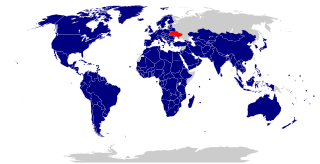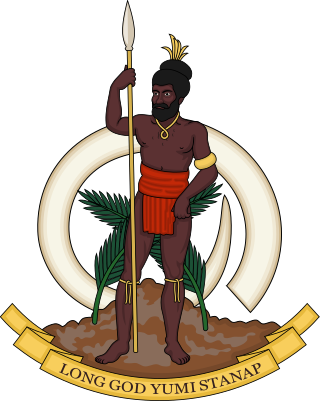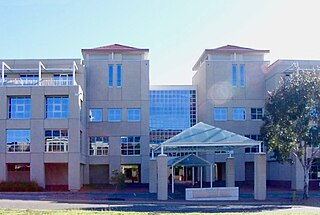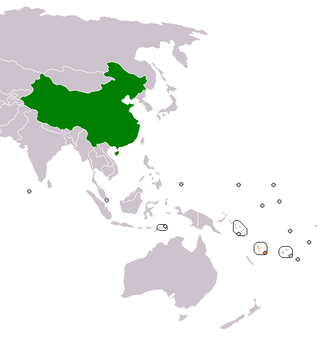 | |
France | Kiribati |
|---|---|
France and Kiribati maintain official diplomatic relations, but no diplomatic presence on each other's territory; the French embassy in Suva is accredited to Kiribati. [1]
 | |
France | Kiribati |
|---|---|
France and Kiribati maintain official diplomatic relations, but no diplomatic presence on each other's territory; the French embassy in Suva is accredited to Kiribati. [1]
In 1995, Kiribati briefly suspended its diplomatic relations with France in protest against French nuclear tests at Mururoa in French Polynesia. [2]
France provides aid to Kiribati in various forms. French aid enabled the opening on nine school classes on Maiana in the early 2000s, and France also recently assisted Kiribati in evaluating its remaining phosphate resources on Banaba. [1]
French exports to Kiribati were worth 24 million Euro in 2002. [1]
Kiribati also allows French vessels to fish in its waters. [3]
I-Kiribati President Anote Tong paid a State visit to Paris in June 2006 to attend a France-Oceania multilateral summit. [4] The summit aimed at "strengthening French-Pacific relations and regional cooperation" in economic, political, environmental and security fields. [5]

Cuba's foreign policy has been fluid throughout history depending on world events and other variables, including relations with the United States. Without massive Soviet subsidies and its primary trading partner, Cuba became increasingly isolated in the late 1980s and early 1990s after the fall of the USSR and the end of the Cold War, but Cuba opened up more with the rest of the world again starting in the late 1990s when they have since entered bilateral co-operation with several South American countries, most notably Venezuela and Bolivia beginning in the late 1990s, especially after the Venezuela election of Hugo Chávez in 1999, who became a staunch ally of Castro's Cuba. The United States used to stick to a policy of isolating Cuba until December 2014, when Barack Obama announced a new policy of diplomatic and economic engagement. The European Union accuses Cuba of "continuing flagrant violation of human rights and fundamental freedoms". Cuba has developed a growing relationship with the People's Republic of China and Russia. Cuba provided civilian assistance workers – principally medical – to more than 20 countries. More than one million exiles have escaped to foreign countries. Cuba's present foreign minister is Bruno Rodríguez Parrilla.

Fiji has experienced many coups recently, in 1987, 2000, and 2006. Fiji has been suspended various times from the Commonwealth of Nations, a grouping of mostly former British colonies. It was readmitted to the Commonwealth in December 2001, following the parliamentary election held to restore democracy in September that year, and has been suspended again because of the 2006 coup, but has been readmitted a second time after the 2014 election. Other Pacific Island governments have generally been sympathetic to Fiji's internal political problems and have declined to take public positions.

In the 19th century France built a new French colonial empire second only to the British Empire. It was humiliated in the Franco-Prussian War of 1870–71, which marked the rise of Germany to dominance in Europe. France allied with Great Britain and Russia and was on the winning side of the First World War. Although it was initially easily defeated early in the Second World War, Free France, through its Free French Forces and the Resistance, continued to fight against the Axis powers as an Allied nation and was ultimately considered one of the victors of the war, as the allocation of a French occupation zone in Germany and West Berlin testifies, as well as the status of permanent member of the United Nations Security Council. It fought losing colonial wars in Indochina and Algeria. The Fourth Republic collapsed and the Fifth Republic began in 1958 to the present. Under Charles De Gaulle it tried to block American and British influence on the European community. Since 1945, France has been a founding member of the United Nations, of NATO, and of the European Coal and Steel Community. As a charter member of the United Nations, France holds one of the permanent seats in the Security Council and is a member of most of its specialized and related agencies.

Georgia's location, nestled between the Black Sea, Russia, and Turkey, renders it strategically important. It is developing as the gateway from the Black Sea to the Caucasus and the larger Caspian region, but also serves as a buffer between Russia and Turkey. Georgia has a long and tumultuous relationship with Russia, but it is reaching out to its other neighbours and looking to the West in search of alternatives and opportunities. It signed a partnership and cooperation agreement with the European Union, participates in the Partnership for Peace, and encourages foreign investment. France, Germany, South Korea, the United Kingdom, and the United States all have embassies in Tbilisi. Georgia in 2004-2008 sought to become a member of NATO, but did not succeed in the face of strong Russian opposition.

The foreign relations of Japan are handled by the Ministry of Foreign Affairs of Japan.

Kiribati is a full member of the Commonwealth, the IMF and the World Bank, and became a full member of the United Nations in 1999. Kiribati hosted the Thirty-First Pacific Islands Forum in October 2000. Kiribati has Least Developed Country Status and its interests rarely extend beyond the region. Through accession to the Lomé Convention, then Cotonou Agreement, Kiribati is also a member of the African Caribbean and Pacific Group. Kiribati maintains good relations with most countries and has particularly close ties to Pacific neighbours Japan, Australia, South Korea and New Zealand. Kiribati briefly suspended its relations with France in 1995 over that country's decision to renew nuclear testing in the South Pacific.

China, officially the People's Republic of China (PRC), has full diplomatic relations with 180 out of the other 192 United Nations member states, Cook Islands, Niue and the State of Palestine. China has had the most diplomatic missions of any state.

The foreign relations of the Russian Federation is the policy arm of the government of Russia which guides its interactions with other nations, their citizens, and foreign organizations. This article covers the foreign policy of the Russian Federation since the dissolution of the Soviet Union in late 1991. At present, Russia has no diplomatic relations with Ukraine due to its ongoing invasion of Ukraine. Other than Ukraine, Russia also has no diplomatic relations with Georgia, Bhutan, Federated States of Micronesia and Solomon Islands.

Ukraine has formal relations with many nations and in recent decades has been establishing diplomatic relations with an expanding circle of nations. The foreign relations of Ukraine are guided by a number of key priorities outlined in the foreign policy of Ukraine.

Vanuatu maintains diplomatic relations with many countries, and it has a small network of diplomatic missions. Australia, France, Japan, New Zealand, the People's Republic of China, South Korea and the United Kingdom maintain embassies, High Commissions, or missions in Port Vila. The British High Commission maintained a continued presence for almost a century, though closed from 2005 until reopening in 2019.

Foreign relations of Australia are influenced by its position as a leading trading nation and as a significant donor of humanitarian aid. Australia's foreign policy is guided by a commitment to multilateralism and regionalism, as well as to build strong bilateral relations with its allies. Key concerns include free trade, terrorism, refugees, economic co-operation with Asia and stability in the Indo-Pacific. Australia is active in the United Nations and the Commonwealth of Nations. Given its history of starting and supporting important regional and global initiatives, it has been described as a regional middle power par excellence.

Nauru, following independence from the United Kingdom, became a sovereign, independent republic on 31 January 1968. Nauru has established diplomatic relations with a number of nations, including most of its Pacific neighbors with which it maintains economic, cultural and administrative ties.

In a referendum on 21 May 2006, the people of Montenegro opted to leave the State Union of Serbia and Montenegro. This result was confirmed with a declaration of independence by the Montenegrin parliament on 3 June 2006. It simultaneously requested international recognition and outlined foreign policy goals.

Oceania is, to the People's Republic of China and the Republic of China, a stage for continuous diplomatic competition. The PRC dictates that no state can have diplomatic relations with both the PRC and the ROC. As of 2024, eleven states in Oceania have diplomatic relations with the PRC, and three have diplomatic relations with the ROC. These numbers fluctuate as Pacific Island nations re-evaluate their foreign policies, and occasionally shift diplomatic recognition between Beijing and Taipei. The issue of which "Chinese" government to recognize has become a central theme in the elections of numerous Pacific island nations, and has led to several votes of no-confidence.
Cuban-Pacific relations are diplomatic, economic, cultural, and other relations between the Cuba and countries situated in Oceania. In the 2000s, Cuba has been strengthening its relations with Pacific nations, which have, for the most part, responded favorably to Cuban medical aid in particular. The first Cuba-Pacific Islands ministerial meeting was held in September 2008 in Havana, with government members from ten Pacific countries—Kiribati, Tuvalu, Nauru, Solomon Islands, Fiji, Tonga, Vanuatu, Samoa, the Federated States of Micronesia and Papua New Guinea—attending. The meeting was a consolidation rather than a starting point of Cuban-Pacific relations.

The Republic of Kiribati and the People's Republic of China (PRC) established diplomatic relations on June 25, 1980, and resumed on September 27, 2019. Between 2003 and 2019, The government of Kiribati recognized the Republic of China, and, in accordance with the "One China" policy, the People's Republic of China did not have diplomatic relations to the country.

Samoa and China (PRC) established official diplomatic relations in 1976. The two countries currently maintain cordial relations; China provides economic aid to Samoa.

Tonga and China (PRC) established official diplomatic relations in 1998. The two countries maintain cordial diplomatic, economic, and military relations.

The Republic of Vanuatu and the People's Republic of China (PRC) established official diplomatic relations on March 26, 1982. China established an embassy in Vanuatu in 1989, while Vanuatu established an honorary consulate in China in 1999; it officially became an embassy in 2005. The current Ambassador of China in Vanuatu is Liu Quan. The current Ambassador of Vanuatu in China is former Minister of Finance Willie Jimmy.

India and Kiribati established diplomatic relations in 1985. The High Commission of India in Suva, Fiji is concurrently accredited to Kiribati. Kiribati maintains an Honorary Consulate in New Delhi.